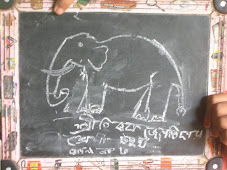 I’m going to tell you a story about Abid. He’s 12 years old and comes from a village called Akhtar in Bihar, India’s poorest state. Three months ago he was sold by Akhtar’s Pradhan, the village leader, to a factory owner in Delhi. The factory owner promised a golden future for Abid: teaching him a skill that would stand him in good stead for a career in the big city. The state infrastructure is so poor in Bihar that Abid has never been to school. Abid’s poverty-stricken parents had no choice but to send Abid to the factory owner receiving a mere 500 rupees (roughly 6 pounds) in return. However upon arrival in Delhi, Abid found quite a different fate from the golden gateway he’d been promised. Abid starts work at 9am everyday. He works in one of the karhanas, small factories, in the slum of Nabi Karim, applying glue to make ladies purses. He gets 1 or 2 hours rest on a day that lasts until midnight… sometimes 1… sometimes 2am. Abid is not paid but all his immediate needs, food and lodging, are taken care of within the constraints of the karhana’s walls. He’s made just one sacrifice – his freedom.
I’m going to tell you a story about Abid. He’s 12 years old and comes from a village called Akhtar in Bihar, India’s poorest state. Three months ago he was sold by Akhtar’s Pradhan, the village leader, to a factory owner in Delhi. The factory owner promised a golden future for Abid: teaching him a skill that would stand him in good stead for a career in the big city. The state infrastructure is so poor in Bihar that Abid has never been to school. Abid’s poverty-stricken parents had no choice but to send Abid to the factory owner receiving a mere 500 rupees (roughly 6 pounds) in return. However upon arrival in Delhi, Abid found quite a different fate from the golden gateway he’d been promised. Abid starts work at 9am everyday. He works in one of the karhanas, small factories, in the slum of Nabi Karim, applying glue to make ladies purses. He gets 1 or 2 hours rest on a day that lasts until midnight… sometimes 1… sometimes 2am. Abid is not paid but all his immediate needs, food and lodging, are taken care of within the constraints of the karhana’s walls. He’s made just one sacrifice – his freedom.Abid is just one of Delhi’s (approximately) 50,000 illegal child labourers. With the help of middlemen, these children are taken as young as 6 years old from India’s poorest villages to be entrapped into a life of virtual slavery in small factories making shoes, bags, clothing and even metal items. As well as evidence of physical abuse there have also been cases of sexual abuse. This grave problem is not unique to Delhi but is prevalent across the country. Government raids on such illegal factories have been irregular and half-hearted.
In August 2009, Pratham set up a drop-in centre for child labourers in the karhanas of the Nabi Karim slum. This centre provides not only a place for the children to study (often for the first time) but also to play and to sleep in a warm and friendly environment. The centre is providing some hope for children like Abid who, at 7pm at night, in his one hour’s break from stitching purses, was completing his maths homework. Arshisayyed and her team of 4 other women are currently collecting data for a survey of Nabi Karim’s 15,000 karhanas to send to the Delhi Commission for the Protection of the Child, as well as to inform the unknowing Pradhan and parents of the fate that awaits their children on arrival in the glistening ‘metro city’.
But the difficulties faced at the centre are
It is clear this dreadful injustice can’t be resolved overnight. But if Pratham can at least put a smile like this one on Abid’s face in his sparse free time – then a bridge to cross this channel is already under construction.
__________________________________________________
www.pratham.org
www.pratham.org.uk
www.prathamusa.org

No comments:
Post a Comment